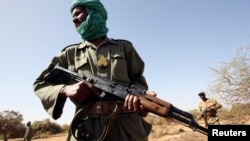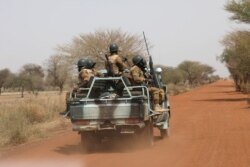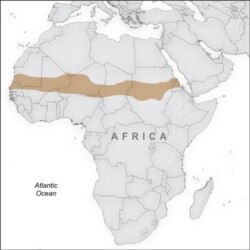The security situation in the Sahel region of Africa is rapidly deteriorating, U.S. officials warned this week.
Terror attacks claimed by Islamist militants against civilians and military targets have particularly risen in Burkina Faso, Mali and Niger.
The Sahel is a semiarid region that encompasses an area south of the Sahara Desert, spanning 10 countries from Senegal in the west to Eritrea in the east. In 2019, violence in the area left more than 2,000 civilians dead.
Since the beginning of 2020, in Burkina Faso alone, violence has displaced 4,000 people a day, the U.N. High Commissioner for Refugees said.
“It would be a mistake to attribute all of this violence to extremism or inter-religious conflict,” Mark Green, administrator of the U.S. Agency for International Development, said during a U.S. Senate hearing Tuesday. “But it would be just as wrong not to recognize that conditions like unresponsive governance, lack of economic opportunity and increasingly limited natural resources, if left unaddressed, will make the region even more vulnerable to extremists, their ideology and method of recruitment.”
Green said dangerous groups, including criminal gangs, arms dealers and extremist groups that seek to expand their power, bring their own violent tendencies to the region, making the situation “even more combustible.”
“There are at least five major violent extremist groups active in the Sahel, and dozens of smaller, loosely affiliated ones,” the U.S. official said.
The Islamic State in the Greater Sahara, an IS affiliate, is active in the region. Other extremist groups, including Ansar al-Islam in Burkina Faso, the Jama’at Nasr al-Islam wal Muslimin (JNIM) in Mali, and other al-Qaida and IS-linked groups also have carried out terrorist attacks in the region in recent years.
US remains engaged
David Hale, U.S. undersecretary of state for political affairs, told the Senate panel that the Trump administration recognizes that instability in Africa, particularly in the Sahel, threatens U.S. national security interests.
"American engagement is crucial,” said Hale, who recently returned from the region. “During my trip, I made clear that we are not abandoning the region. To the contrary, we are bolstering our diplomatic engagement.”
The United States has between 6,000 and 7,000 troops in Africa, mainly in West Africa, and is considering a reduction. The possible reduction is reportedly part of a worldwide review by the Department of Defense, which is looking for ways to tighten its focus on China and Russia. These plans have alarmed African governments that rely on U.S. support for combating extremism.
“I assured African leaders that as the Department of Defense conducts its combat and command reviews, we will not undertake any hasty or destabilizing adjustments to our military posture,” Hale added.
Last week, the U.S. State Department appointed J. Peter Pham as the first U.S. special envoy for the Sahel region.
Pham will “maximize U.S. diplomatic efforts in support of security and stability in the Sahel,” State Department spokeswoman Morgan Ortagus said in a tweet.
Countering violent extremism
U.S. officials said that in addition to providing humanitarian assistance, the U.S. also has been involved in countering violent extremism in the Sahel.
“We work with governments to enhance their countering violent extremism response strategies, as well as responsiveness to basic citizen needs,” Green noted.
Last year, USAID launched a development partnership in the Sahel, an expansion of the agency’s programming approach for the region.
The partnership “will focus first on Burkina Faso and Niger, but we’re expanding elsewhere. It aims to address the intertwining nature of recurrent social, political and environmental crises,” Green said.






